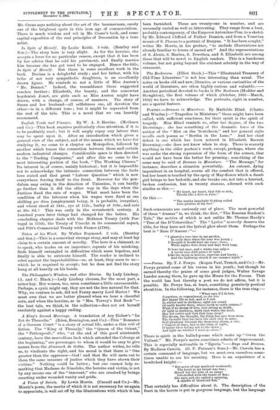English Trade and Finance. By W. A. S. Hewins. (Methuen
and Co.)—This book requires particularly close attention, if it is to be profitably read ; but it will amply repay any labour that may be spent upon it. After an introduction which gives a general view of the subject, and of the means which we have for studying it, we come to a chapter on Monopolies, followed by another which traces the connection between them and certain modern industrial changes. Considerable space is then devoted to the " Trading Companies," and after this we come to the most interesting portion of the book, " The Working Classes." Its interest is, of course, mainly historical; but it is impossible not to acknowledge the intimate connection between the facts here stated and that great "Labour Question" which is now everywhere forcing itself to the front. However far the pen- dulum may swing in the direction of Unionism, it can hardly go further than it did the other way in the days when the Justices fixed the rate of wages. What must have been the condition of the labourer when his wages were fixed at one shilling per diem (employment being, it is probable, irregular), and wheat stood at 144s., rye at 112s., barley at 104s., and oats at 38s. 8d. ? This was early in the seventeenth century. A hundred years later things had changed for the better. His concluding chapter deals with the Methuen Treaty (with Por- tugal in 1703), the Treaty of Utrecht in its commercial aspect, and Pitt's Commercial Treaty with France (1786).


















































 Previous page
Previous page